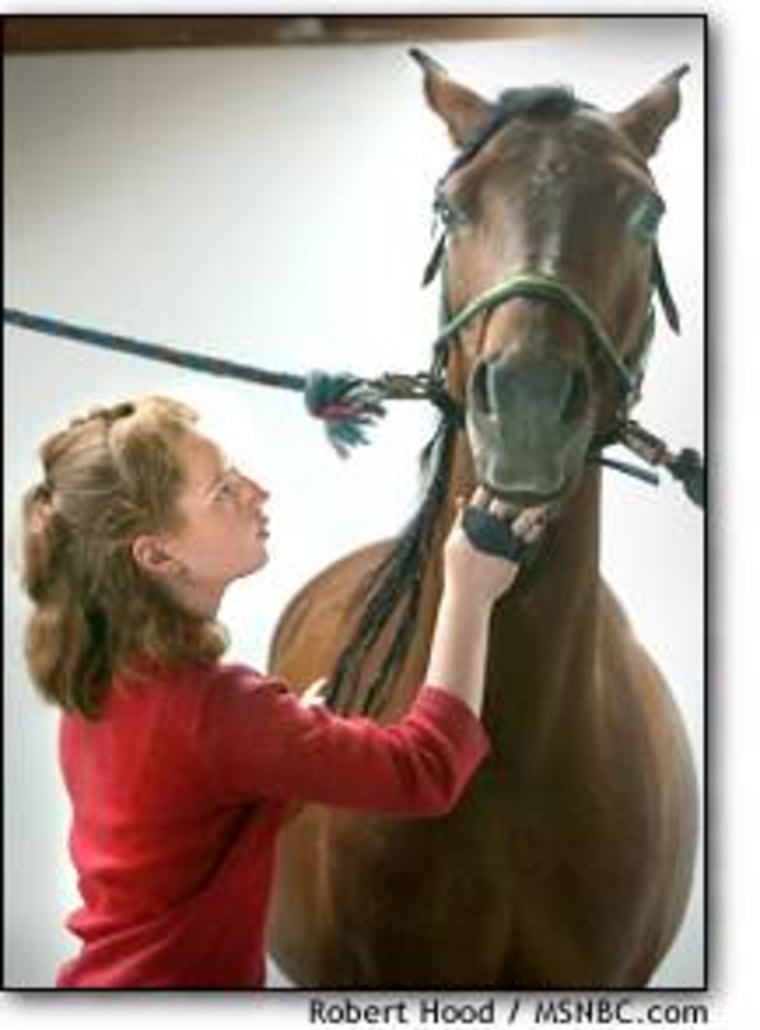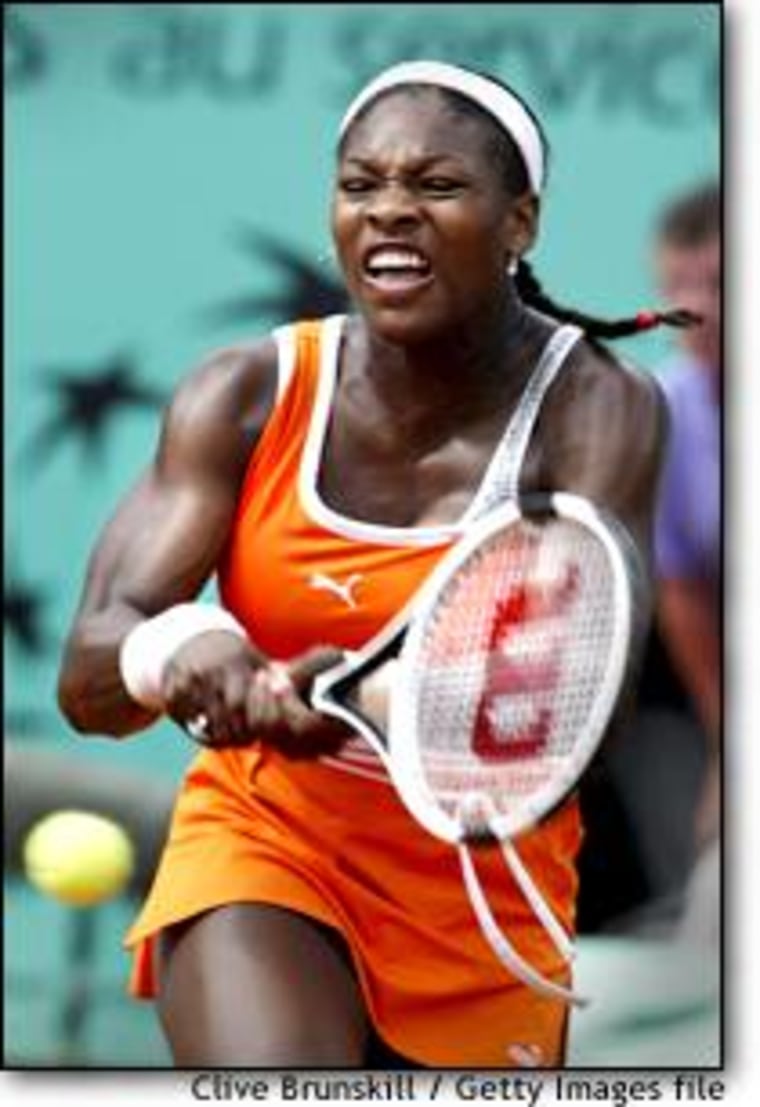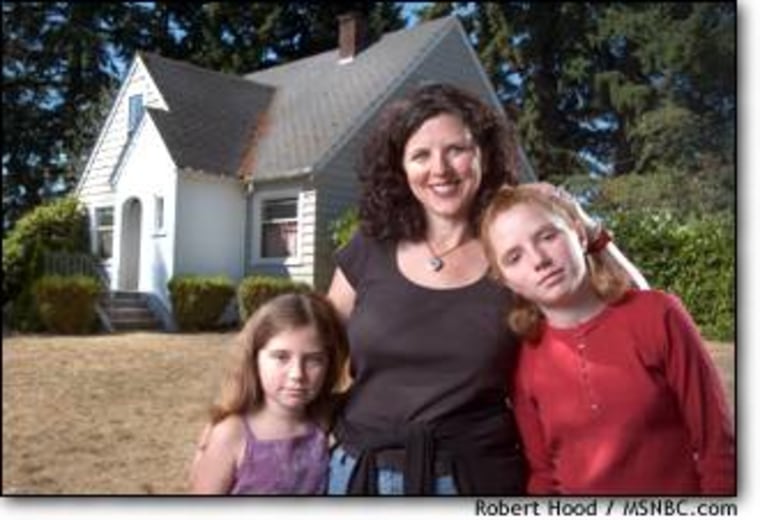At 12 years old, Alyssa Elmore is on her way to becoming a renaissance child. A fan of Kelly Clarkson and the stars of “American Idol,” she’s big on horses and interested in filmmaking and architecture. Her situation is a far cry from when she was diagnosed with attention deficit disorder, put on Ritalin and told to enroll in a special education class. Now, when the school bus rolls through her Bremerton, Wash., neighborhood, Alyssa stays home. She’s not skipping school — she’s already there.
Like tens of thousands of other parents, Marti Elmore, Alyssa’s mother, began home schooling Alyssa and her sister Aine, 7, out of frustration with the quality of education her children were getting in public schools.
A stay-at-home mom and former PTA member, Elmore took action after Alyssa was diagnosed with ADD in 1999.
‘What's wrong with me?’
“Alyssa went to a private school in Seattle for kindergarten and first grade, then to public schools here starting in the second grade,” Elmore says. “They wanted her tested and referred me to a doctor.”
After spending months working with the school system to resolve Alyssa’s problems and unable to find a local, non-religious private school, Elmore and her husband, Rocky, pulled Alyssa out of formal classes altogether and joined a local network of home-schoolers.
“When Alyssa was in school, she thought, ‘What’s wrong with me?’ ” says Elmore. “She kept saying, ‘I’m stupid, I’m dumb.’ We saw her esteem going downhill.”
Four years later, Alyssa is off Ritalin and working above her grade level in many subjects. While in some ways she’s a typical adolescent — “She used to be into Britney Spears, but not so much anymore,” her mother says — in other ways she’s bloomed beyond her age.
“She’s doing volunteer work now, and she’s really into horses and dogs,” says Marti Elmore. “She wants to pursue animal science and business. She’s also really into architecture — sketching floor plans and designing a neighborhood that’s equestrian-friendly. She’s into filmmaking, too.”
Elmore says Alyssa’s dramatic turnaround is due in large part to home schooling, a trend to watch.
A ‘national phenomenon’
As the nation continues to grapple with a fragile economy, larger class sizes, school violence and fears of terrorism in the wake of Sept. 11, the number of home-schooled children is growing.
In 2001, the Census Bureau said home schooling was “emerging as an important national phenomenon.” As many as 2 million children were home-schooled at that time, and the number is increasing 15 percent to 20 percent annually, the bureau said.
Census statistics show that home schooling has increased most dramatically in suburbs and rural areas in the West and Midwest, among middle-class families with higher levels of education and one parent who stays home. Most home-schooling parents are white, but a growing number of black and Hispanic families are also keeping their kids home.
Kids measure up academically
In raw numbers, home schooling is no threat to traditional education. More than 50 million students attend more than 94,000 public elementary and secondary schools in the United States.
But as school budgets shrink and enrollments rise, home schooling has proved to be an effective alternative for many families.
And it has more than held its own in standardized measures of learning:
In 2002, home-schooled students averaged 1,092 on the SAT, compared with the national average of 1,020, according to data from the Home School Legal Defense Association.
A 2001 study by the U.S. Department of Education found that minority children educated at home fared better on reading and math scores than their counterparts in public schools.
A 1998 study by the Education Policy Analysis Archives found that achievement levels of homeschoolers “are exceptional.” The peer-reviewed scholarly electronic journal reported that by the time “home school students are in eighth grade, they are four years ahead of their public/private school counterparts.”
The ‘S’ word
Despite growing numbers of educators and lawmakers who attest to home schooling’s benefits, there’s still widespread suspicion about the practice, and many home-schooled kids are stereotyped as reclusive misfits or children of parents on the fringe of society.
Home schooling first became a measurable trend when it was embraced by families that embraced the counterculture ethos of the 1960s and ’70s. Later, in the 1980s, the movement was largely driven by the religious right and anti-government groups that believed public schools had become morally and ideologically corrupt.
Times have changed. “Home schooling isn’t just being done by a bunch of people with guns in Idaho,” says Jane Ferrall, a former attorney who teaches her four children — ages 13, 11, 8 and 5 — at home in Darien, Conn. “It’s really becoming a mainstream thing.”

Still, many people imagine that most home-schooled students are kept cloistered with little opportunity to spend time with children their own age.
“There’s an image of us sitting at the kitchen table all day with no access to other kids,” Marti Elmore says. “Home-schoolers get out in the world. They’re not stuck in a building for six hours.”
Some critics argue the biggest problems are that children who learn at home are overprotected and don’t develop social skills.
“Unless you’re going to keep your children in a bubble for the rest of their lives, you have to expose them to a world that isn’t always sweet and nurturing,” says Dr. Ted Feinberg, assistant executive director for the National Association of School Psychologists.
“Education has to be looked on in a broader context,” Feinberg says. “If we see it solely as the acquisition of academic skills, that’s a narrow view of what an educated person or child needs to be.”
‘A lot of meanness’
But some home-schooling parents argue that the pressures of sex and drugs and the danger of violence in schools far outweigh the risks of raising a sheltered child.
Concerns about harassment eventually led the McFaddens, an Army family stationed in Fayetteville, N.C., to home school their kids.
Mark and Susan McFadden’s decision came after their daughter Kaitlin was repeatedly bullied by a boy in her second-grade class who made sexual advances toward her and ultimately threatened to kill her. Despite attempts by school officials to intervene, the harassment continued and the McFaddens finally pulled Kaitlin out of school.
“We were just completely frustrated. We were concerned for her safety,” says Susan McFadden.
Now, Kaitlin’s work is much improved. “She performs very well on her standardized tests and she makes friends outside the home, so socialization isn’t an issue,” Susan McFadden says.
Lawmakers, colleges take notice
Parents teach their children in a variety of ways. Some use textbooks, and test and grade their kids just as a teacher would. Others take a more informal approach, combining school and community resources and child-led discovery. Still others let their children lead the way, encouraging the kids to pursue their personal interests.
Given the one-on-one attention that home-schooled children receive and the ability to customize curriculum, the testimonials of greater academic achievement aren’t surprising. Home-schoolers make national headlines winning spelling and geography bees, and some, like the artist Andrew Wyeth and tennis superstars Venus and Serena Williams, have achieved at the highest levels.

Lawmakers are beginning to take notice. In July, Colorado Rep. Marilyn Musgrave introduced the Homeschool Non-Discrimination Act in Congress. Musgrave’s bill seeks to put home schooling on a more level footing with traditional schools. The measure would allow home-schooled students to be eligible for college scholarships and set equal treatment for the dissemination of home-schooled students’ records and those of students from traditional schools.
Academia also has taken notice. Top colleges have begun accepting record numbers of home-schooled students.
At Harvard University, the home-educated are treated like any other applicants during the admissions process. They’re required to submit SAT scores, letters of recommendation, information on extracurricular activities, a personal essay and grades from any courses they’ve taken.
William Fitzsimmons, dean of admissions and financial aid at Harvard, says that the university has admitted 14 home-schooled students set to graduate in the classes of 2005, 2006 and 2007.
‘It's not a panacea’
While children like Alyssa Elmore have blossomed while learning at home, parents concede it’s not for everyone.
“Home schooling is for highly motivated kids who want to learn and don’t need the daily accountability,” says Susie Marshall, a teacher in charge of testing for home-schooled families in the Riverview School District, which serves Carnation and Duvall, Wash., and a parent who home-schooled her daughter.
It’s a huge commitment for parents as well, she says.
“It’s not a panacea,” adds Ferrall. “I don’t think there’s any option that’s a perfect answer. ... I know people who have these romantic notions that home-school families are better families, that home-schooled kids are better kids. I don’t think you have to overmake the case. It’s just a valid educational option.”
